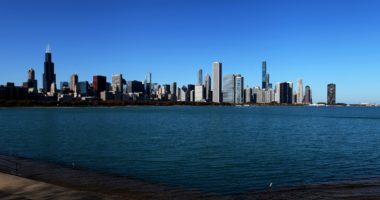Illinois Legislature Takes Another Swing At Amending Tax Code For Future Chicago Casino


The terms of an article that did restructure the Chicago casino tax have been approved by the Illinois Legislature. If Gov. J. If B. Pritzker signs the act into law, there may be more hope that the project will actually materialize.
Amendment 5 also contains some intriguing language related to the term of reconciliation fees and video lottery terminals at the annual Illinois State Fair.
How the amendment would affect the game duty in Chicago
Under existing laws, prospective operators of a casino in Chicago are already liable for an extra opportunity duty of 33.3%. This is in addition to the same progressive tax rates that current casinos in other areas of Illinois are subject to.
The amendment’s language may set up a new graduated income schedule for a Chicago blackjack. The proposed rates and levels for total annual profits for slots would be as follows:
- The state and Chicago will receive up to and including $25 million, with the state getting 12% and Chicago getting 10.5%.
- Reworded: Between $25,000,001 and $50,000,000, 16% goes to Illinois and 14% goes to Chicago.
- In the range of $50,000,001 to $75,200,000, it is found that 20.1% is attributed to Illinois (IL) and 17.4% to Chicago.
- 21.4% is allocated to Illinois and 18.6% to Chicago out of the range from $75,000,001 to $100,000,000.
- 22.7% is allocated to Illinois and 19.8% to Chicago within the budget range of $100,000,001 to $150,000.
- 24.1% is allocated to Illinois and 20.9% to Chicago for amounts ranging from $150,000,001 to $225,000.
- 26.8% is allocated to Illinois and 23.2% to Chicago: from $225,000,001 to $1 billion.
- 34.7% of over $1 billion goes to Chicago and 40% goes to Illinois.
fresh game deadline for tables
The amendment also proposes a new deadline for table games, but this is specifically confined to the potential future casino in Chicago. Much like the slots, it enforces a progressive privilege tax based on total yearly revenue.
- The amount is up to $25 million, of which 6.9% is allocated to the City of Chicago and 8.1% to the state.
- In the range of $25,000,001 to $75,200,000, it is found that 9.6% is allocated to IL and 8.4% to Chicago.
- 12.3% of the amount is allocated to Al and 10.7% is allocated to Chicago: the amount ranges from $75,000,001 to $1,875,000.
- Illinois receives 13.5% and Chicago receives 11.5% from the range of $175,000,001 to $225,000.
- The range of $225,000,001 to $275,000 includes 15.1% to Illinois and 12.9% to Chicago.
- 16.2% is allocated to IL and 13.8% to Chicago: from $275,000,001 to $325,000.
- Over $325,000, 18.9% goes to Illinois and 16.1% goes to Chicago.
This doesn’t truly indicate a substantial shift in the influential rates. However, it would notably raise the current thresholds of the graduated levels, reducing the annual tax responsibilities of the casino operator.
For example, the existing law applies a maximum rate of 74.7% on slot machine earnings over $200 million. However, under the new scheme, this rate would not be applied unless the game generated revenue of $1 billion from that source.
After receiving approval from both chambers of the Illinois Legislature on Friday, the amendment now only needs Gov. Pritzker’s signature. This modification is essential for the progression of the Chicago casino project.
Why does the article deal with the casino duty in Chicago?
The first duty schedule had significant problems. This became glaringly obvious when an external party with extensive knowledge of casino gambling scrutinized the situation.
Union Gaming Analytics carried out a feasibility study in August for legislative research. The study, among other things, explored possible locations for a game in Windy City.
The study revealed that under the existing tax schedule, it would be nearly impossible for a casino operator to make any profit. It was found that the casino would have to surrender 72% of its earnings to the city and state.
All business owners concur that managing all operational expenses is difficult, not to mention trying to achieve a 28% profit margin. However, this problem wasn’t limited to individuals aiming to set up a game near Lake Michigan.
This posed a risk as the state contemplated launching a game in Chicago in the future to finance retirement and other financial obligations. Consequently, several events have been addressing this issue for years.
The next day could be the charm.
In the previous November, Amendment 3 was proposed by Illinois Representative Bob Rita. This amendment intended to keep the tax rates largely unchanged while increasing the thresholds for each graduated tier.
The maximum rate of 74.7% would have been applicable only to slot machine revenue exceeding $1 billion, in line with Amendment 5. Moreover, it set the board game schedule at the same levels as stated in Amendment 5.
Amendment 3 was never put to a vote on the entire floor of the Illinois House. As a result, Lori Lightfoot, the Chicago mayor, decided to give it a try.
Last December, an amendment that Lightfoot supported made it to the Illinois House floor. She played a role in developing the language of the amendment and also testified in its favor to members of the Illinois House. The main point of this amendment was to provide property tax reductions to developers.
However, the House rejected the article. At that time, Lightfoot blamed the failure on lawmakers who were trying to take advantage of the situation by incorporating their own funding measures to aid their districts.
This marked Rita’s second attempt this week, which has proven to be considerably more successful. If Pritzker approves and turns the article into law, it could initiate the process of establishing a casino in Chicago.
The amendment would not only bring about that change. It also contains significant provisions for state casino operators and parties interested in video lottery terminals at the state fairgrounds.
What else does Amendment 5 contain?
The Illinois Department of Agriculture now has the authorization to operate up to 50 game drawing stations at the Illinois State Fair in Springfield. The article also offers some leeway for prospective operators of new gambling ventures in Chicago and other areas.
The original laws in Chicago and four other counties in the state – Cook County, Danville, Rockford, and Williamson County, permitted new games.
The law mandates that new license holders incur a balancing charge. This cost compensates for the difference between the license’s value when the state issued it and its value after the licensee has entered the new market.
Illinois law stipulates that the fee for each operator is determined based on the most profitable 12-month period within the first three years of business operation. This period, not necessarily from January to December, could be any continuous 12-month stretch.
Except for an initial fee of $15 million for reconciliation, the operator is required to pay 75% of that amount. Under the current law, the technician is given a two-year period to complete the payment.
Amendment 5 extends the deadline for payment to six years. This move, akin to increasing the revenue plan limits for the Chicago casino, is driven by a solitary goal.
What are the goals of all these adjustments?
This article’s rationale can be interpreted in two different ways. Both interpretations suggest a potential result that the Illinois Legislature might be aspiring towards.
Nearly a month after the latest gambling expansion law was passed, a new game has seen little growth across all five locations. Casino operators find the purchase valuable due to a combination of concerns about fees, taxes, and enhancement expenses.
One way to contemplate altering the schedule of these charges and taxes is for the state to invest significantly in these prospective gaming websites. With the higher tiers and extended repayment terms, game developers would be able to recoup their initial expenditure in less time.
The position itself is wagering on the success of these games, speculating that it will generate more profits in the long run by taking a short-term loss, rather than adhering strictly to the law’s requirements for casino operators.
The potential for more betting operators in the future for Illinois sports bettors could be unlocked by the signature of Pritzker & rsquo.







